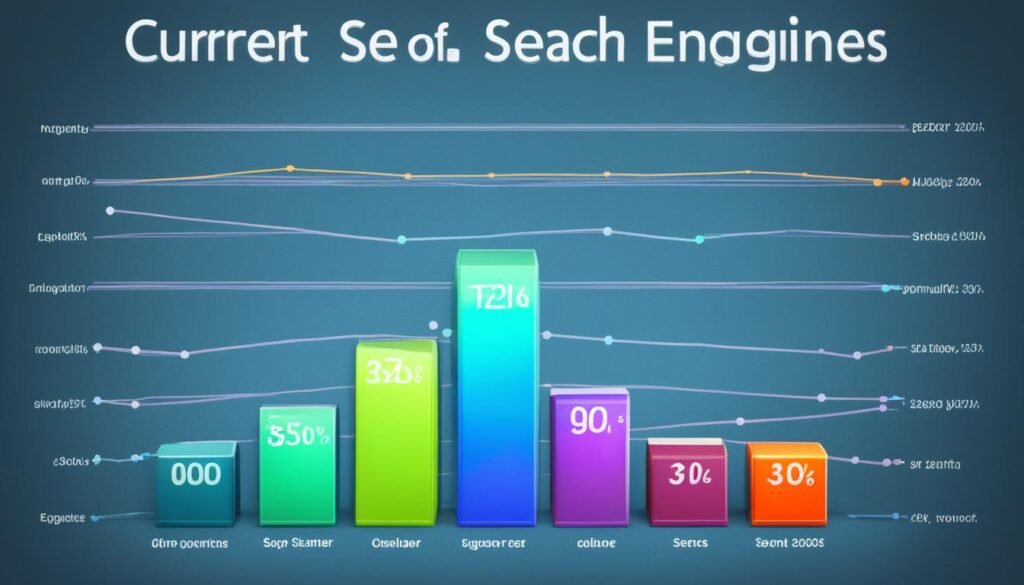Search engines play a critical role in our digital world by helping us find information quickly and efficiently. But have you ever wondered how search engines actually work? In this article, we will explore the fascinating inner workings of search engines, from crawling and indexing web pages to providing relevant search results based on complex algorithms.
Search engines, such as Google and Bing, employ sophisticated algorithms and technology to deliver the most relevant search results to users. These algorithms are constantly evolving to meet the ever-changing demands of users and provide the best possible search experience.
One of the fundamental processes search engines utilize is crawling. Search engine crawlers, also known as bots or spiders, systematically navigate the web by downloading web pages and following links to discover new pages. This process allows search engines to find and index a vast number of web pages, making them accessible for search queries.
Once a page is crawled, it is added to the search engine’s index, which acts as a massive database containing relevant information about each URL. This information includes keywords, content types, freshness, and previous user engagement. Having an index enables search engines to quickly retrieve and display search results that match a user’s query.
When a user enters a search query, the search engine’s algorithm comes into play. This algorithm ranks the indexed web pages based on various factors such as relevance, popularity, and user experience. The goal is to present a user with a relevant set of high-quality search results that best answer their query.
As search engines continuously refine their algorithms to enhance the user experience, they also take into account personalized factors. Location, language preferences, and search history all influence the search results delivered to an individual user. This personalization ensures that users receive search results tailored to their specific needs and interests.
Understanding how search engines work is crucial for website owners and digital marketers. By optimizing web pages for search engines, businesses can improve their visibility, increase organic traffic, and ultimately drive targeted leads and sales.
Key Takeaways: Search Engines Work
- Search engines use web crawlers to discover and index web pages.
- Indexed pages are stored in a vast database, allowing for quick retrieval of search results.
- Algorithms rank search results based on relevance, popularity, and user experience.
- Personalized factors, such as location and search history, influence search results.
- Optimizing web pages for search engines can improve visibility and drive organic traffic.
Search Engine Crawling
Search engine crawling is a vital step in the process of how search engines work. It involves the use of web crawlers, also known as search engine bots or spiders, to visit and download known URLs across the web. One well-known example is Google’s own web crawler, Googlebot, which is responsible for crawling billions of pages.
During the crawling process, the search engine renders the webpage and executes any JavaScript it encounters. This allows the search engine to understand how the page appears to users and uncover dynamic content or links that may not be visible in the static HTML code.
However, successful crawling depends on various factors. For instance, search engine crawlers must be able to access and navigate the website’s pages. Issues such as server problems, network disruptions, or directives set in the robots.txt file can affect how crawlers interact with a site.
“Search engine crawling is essential for discovering and adding new pages to the search index.”
The ultimate goal of the crawling process is to discover and add new pages to the search index. These indexed pages contain relevant information about the webpage, such as keywords, content type, freshness, and previous user engagement. By building a comprehensive index, search engines can provide users with a diverse range of search results that match their specific queries or search terms.
Here is an example of how search engine crawling works:
| Crawling Process | Key Steps |
|---|---|
| Crawler Visits URL | The search engine crawler initiates a visit to a known URL or follows a link from a previously crawled page. |
| Webpage Rendering | The search engine renders the page, fetching its HTML, CSS, JavaScript, and other associated resources. |
| JavaScript Execution | If the page contains JavaScript, the search engine executes it to identify any dynamic content or links. |
| Fetching Additional Pages | If the rendered page contains links to other pages, the crawler adds them to the crawl queue for subsequent visits. |
| Indexing | Once the crawling process is complete, the search engine indexes the relevant information from the crawled page. |
Search Engine Indexing

After a page is crawled, search engines like Google try to understand what the page is about through indexing. This process involves analyzing the textual content, key content tags, attributes, images, videos, and more. Google also determines if a page is a duplicate of another page or canonical, which affects its ranking in search results. The information about the indexed pages is stored in the search index, a large database hosted on thousands of computers. Indexing plays a crucial role as users can only find webpages in search results if they are indexed by search engines.
| Indexed Content | Impact on Search Engine Rankings |
|---|---|
| Textual content | Helps search engines understand the topic and relevance of the page. |
| Key content tags | Provides additional context and highlights important information. |
| Attributes | Helps search engines classify and categorize the page. |
| Images and videos | Enhances the user experience and provides visual information. |
Importance of Indexing for Search Engines
Indexing is a vital process in search engine optimization as it determines whether webpages appear in search results. If a page is not properly indexed, it will remain invisible to users. To ensure maximum visibility, website owners must create content that search engines can easily understand and index. This includes using relevant keywords, optimizing meta tags, and structuring content with appropriate headers and subheadings.
Search engines like Google have complex algorithms that analyze various factors to determine the relevance and quality of a webpage. By understanding how indexing works, website owners can optimize their content to improve search engine rankings and drive organic traffic to their sites.
Overall, search engine indexing is a critical component of the search process. It enables search engines to organize and present relevant search results to users, ultimately improving the user experience and satisfaction.
Ranking of Search Results

Once a user enters a search query, search engines use their algorithms to rank the most relevant results from their search index. The ranking of search results is determined by a combination of various factors that search engines consider when evaluating webpages. While the exact ranking factors may vary for each search engine, there are certain common factors that play a crucial role in determining the search engine rankings.
- Backlinks: Backlinks are considered one of the strongest ranking factors. They represent the number and quality of other websites linking to a particular webpage. The more reputable and relevant the linking websites, the higher the chances of ranking well in search results.
- Relevance: Search engines analyze the relevance of a webpage to the search query. This involves evaluating factors such as the presence of keywords in the page content, title, headings, and meta tags. Pages that are highly relevant to the search query have a better chance of ranking higher in search results.
- Freshness: Freshness refers to the recency of the content on a webpage. Search engines prioritize fresh and up-to-date content as it is more likely to be relevant to users. Websites that consistently publish new and relevant content have a better chance of ranking well in search results.
- Page Speed: Search engines consider the loading speed of webpages as a ranking factor. Faster-loading webpages provide a better user experience, and search engines aim to present results that provide the best user experience possible.
- Mobile-Friendliness: With the increasing use of mobile devices, search engines factor in the mobile-friendliness of webpages when determining rankings. Webpages that are optimized for mobile devices and provide a seamless user experience on smaller screens are more likely to rank well.
It’s important to note that search engine algorithms are constantly evolving and may incorporate new ranking factors over time. Additionally, search engines like Google personalize search results based on the user’s location, language preferences, and search history. This personalization further influences the rankings seen by individual users.
Overall, understanding the ranking factors and optimizing webpages accordingly plays a crucial role in improving search engine rankings and driving organic traffic to websites.
Paid Results and Market Share

Search engines provide two types of search results: organic results and paid results. Organic results are generated from the search index and are based on the relevance of the webpages to the user’s query. On the other hand, paid results are displayed based on advertisers’ bids and their relevance to the search query.
When a user clicks on a paid search result, the advertiser pays the search engine for that click. This pay-per-click model generates revenue for the search engine and allows advertisers to promote their products or services to a targeted audience.
Search engines are constantly striving to provide the best and most relevant results to their users. This is because the search engine market is highly competitive, and gaining market share is crucial for search engines to attract more advertisers and generate more revenue from paid search results.
One way search engines achieve this is by continuously improving their search algorithms to deliver more accurate and personalized search results. By understanding user intent and preferences, search engines can present highly relevant paid results, increasing user satisfaction and encouraging more users to click on paid search advertisements.
Table: Market Share of Search Engines
| Search Engine | Market Share |
|---|---|
| 92.05% | |
| Bing | 2.79% |
| Yahoo | 1.6% |
| Baidu | 1.29% |
| Yandex | 0.52% |
As seen in the table above, Google dominates the search engine market with a staggering 92.05% market share. Bing, Yahoo, Baidu, and Yandex follow behind, but they hold significantly smaller portions of the market.
Search engines with a larger market share have the advantage of attracting more advertisers and offering a wider audience for their ads. This creates a positive feedback loop where search engines with more users can gain even more market share, as increased user activity generates more ad clicks and revenue.
However, it’s important for search engines to maintain a delicate balance between generating revenue from paid search results and providing a satisfactory user experience. Displaying too many paid results at the expense of organic results can negatively impact user trust and ultimately drive users away from a search engine.
Key Takeaways:
- Search engines offer both organic and paid search results.
- Paid search results are displayed based on advertisers’ bids and relevance.
- Search engines aim to gain market share to attract more advertisers and generate more revenue.
- User satisfaction is crucial for search engines to maintain their market share.
- Google currently dominates the search engine market with over 92% market share.
Personalization and User Factors

In the world of search engines, personalized search results have become the norm. Search engines, like Google, optimize search results to cater to individual users based on various factors such as location, language, and search history. By understanding user preferences, search engines aim to deliver more relevant and tailored search experiences.
For instance, when a user searches with local intent, search engines present localized versions of content. This ensures that users receive search results that are specific to their geographical location, helping them find relevant information more easily. Additionally, search engines consider a user’s language preferences and display language-specific search results to provide a personalized browsing experience.
One crucial aspect of personalized search results is user behavior and search history. Search engines collect information about which websites a user visits, the keywords they search for, and the content they engage with. These user factors influence the subsequent search results presented to that particular user.
Factors such as location and search history play a significant role in determining the relevance and ranking of search results. By analyzing data related to user behavior, search engines can understand user preferences and provide search results that align with their interests, improving the overall search experience.
Understanding these personalized search factors is essential for website owners and marketers. By optimizing websites to be more relevant to specific user preferences, businesses can increase their visibility in search results and better connect with their target audience.
| Benefits of Personalized Search Results: |
|---|
| 1. Enhanced Relevance: Personalized search results present content that aligns with users’ interests and preferences, providing more relevant information. |
| 2. Improved User Experience: By tailoring search results to individual users, search engines enhance the overall browsing experience, saving users time and effort. |
| 3. Targeted Advertising: Personalized search results allow advertisers to reach their target audience more effectively, increasing the efficiency of advertising campaigns. |
| 4. Increased User Satisfaction: By presenting users with search results that resonate with their preferences, search engines contribute to higher user satisfaction levels. |
As search engines continue to evolve, personalized search results will become even more refined. Businesses should adapt their SEO strategies to leverage these user factors and provide content that meets the specific needs and interests of their target audience. By understanding the importance of personalized search results and user factors, website owners can stay ahead of the competition and deliver a superior browsing experience to their users.
The Role of Robots.txt

Robots.txt is a crucial file that plays an essential role in guiding search engines on what they should and shouldn’t visit on a website. It serves as a communication channel between website owners and search engine crawlers, enabling control over access and crawling of webpages.
Site owners utilize Robots.txt directives to provide instructions to search engine crawlers, dictating which pages they are allowed to crawl and index. By specifying the appropriate directives in the Robots.txt file, website owners can ensure that search engine crawlers focus their attention on the most relevant and valuable pages, thereby optimizing the crawling process.
One of the primary applications of Robots.txt is the ability to disallow pages from crawling. By including specific directives in the Robots.txt file, website owners can prevent search engine crawlers from accessing and crawling certain pages. This can be beneficial in various scenarios, such as when there are pages with sensitive or private information that shouldn’t be made public or indexed by search engines.
Furthermore, disallowed pages can also include canonical tags, which redirect search engine crawlers to similar pages that are allowed to be crawled. This ensures that the information on the disallowed pages is still accessible to search engines, but through alternative URLs.
It’s crucial for website owners to understand and properly utilize Robots.txt to avoid crawling issues. Incorrectly configured Robots.txt files can unintentionally block search engine crawlers from accessing and indexing important pages, leading to negative impacts on search engine rankings and visibility.
To emphasize the importance of Robots.txt, consider the example of a website with a blog section that contains numerous dynamically generated pages. These dynamically generated pages may have similar content, resulting in potential duplicate content issues. By instructing search engine crawlers to disallow the crawling of these dynamically generated pages through Robots.txt, website owners can mitigate the risk of duplicate content issues and ensure that crawlers focus on indexing the primary pages effectively.
When dealing with large websites or complex structures, managing Robots.txt can become challenging. However, there are various tools available that can assist website owners in generating and validating Robots.txt files, simplifying the process of keeping crawlers well-informed.
Best Practices for Robots.txt Usage:
- Regularly update and review the Robots.txt file to accommodate changes in website structure and content.
- Ensure that disallowed pages are redirected to appropriate alternative URLs using canonical tags.
- Use robots’ directives thoughtfully to strike a balance between preventing sensitive information from being crawled and ensuring essential pages are discoverable.
- Test and validate Robots.txt using available tools to verify its accuracy and effectiveness.
- Consult the official documentation provided by search engines, such as Google’s Robots.txt Specifications, for detailed guidance on configuring and managing Robots.txt files.
| Common Robots.txt Directives | Description |
|---|---|
| User-Agent | Defines the search engine crawler or user agent to which the following directives apply. |
| Disallow | Specifies the pages or directories that search engine crawlers should not access or crawl. |
| Allow | Specifies the pages or directories that search engine crawlers are allowed to access and crawl, overriding any disallow directives. |
| Sitemap | Specifies the location of the XML sitemap(s) for the website. |
| Crawl-Delay | Sets a delay in the crawling process, specifying the time interval between successive crawls. |
Differences Between Search Engines

Search engines like Google and Bing employ unique algorithms and methodologies for crawling, indexing, and ranking webpages. As a result, search results for the same query can vary across different search engines. A page that ranks highly on Google may not necessarily have the same level of visibility on Bing, primarily due to differences in ranking factors and algorithms.
To optimize webpages for better visibility and ranking on specific search engines, it is important to understand the differences between them. By tailoring your SEO strategies to align with the specific ranking factors and algorithms of different search engines, you can enhance the chances of your webpages ranking well in search results.
Search Result Variations
Search result variations occur when different search engines interpret and analyze webpages differently, yielding distinct search results for the same query. This can be attributed to the variations in ranking factors and algorithms employed by different search engines.
For instance, Google’s algorithm relies heavily on backlinks as a ranking factor, while Bing considers a broader range of factors, including social media signals and keyword relevance, in addition to backlinks. Consequently, pages that perform well on Google may not have the same level of visibility on Bing.
In order to optimize your webpages for different search engines, it is crucial to perform in-depth research and analysis to understand the specific ranking factors and algorithms utilized by each search engine.
Google vs. Bing
Google and Bing, being two of the most widely used search engines, have distinct differences in their approach to crawling, indexing, and ranking webpages.
Key Differences:
- Google places significant emphasis on backlinks as a ranking factor, while Bing considers a broader range of factors, including social media signals and keyword relevance.
- Google prioritizes fresher content, while Bing tends to favor more established and authoritative websites.
- Google employs a more complex and intricate algorithm, while Bing focuses on delivering straightforward and transparent search results.
Understanding these differences can help you tailor your SEO strategies to optimize your webpages for better visibility and ranking on specific search engines.
By adapting your optimization efforts to cater to the specific ranking factors and algorithms of different search engines, you can improve the chances of your webpages ranking highly and increase organic traffic to your website.
Also Read : How Foreign Traffic On Website Can Help
Conclusion
Understanding how search engines function is crucial for effective SEO optimization and achieving higher rankings in search results. Search engines, such as Google and Bing, rely on algorithms and crawlers to navigate and organize the vast amount of web content. These algorithms analyze numerous factors, including relevance, backlinks, page speed, and user satisfaction, to determine the ranking of webpages.
As a website owner or SEO practitioner, it is essential to optimize your webpages by following best practices. This involves creating high-quality content that caters to users’ needs, ensuring your website is technically sound, and building strong backlinks from reputable sources. By focusing on user satisfaction and providing valuable information, you can improve your website’s performance in search engine rankings.
Furthermore, staying up to date with the constantly evolving search engine algorithms and industry trends is crucial. Regularly monitoring and analyzing your website’s SEO performance will help you identify areas for improvement and make informed optimization decisions. By implementing effective SEO strategies, you can drive organic traffic to your website, increase visibility, and ultimately achieve your online business goals.
FAQs
Q: What is the role of search engines in the online world?
A: Search engines help users find relevant information on the internet by crawling and indexing web pages, and then providing search results based on user queries.
Q: How do search engines understand and rank web pages?
A: Search engines use complex algorithms to analyze factors like keywords, content quality, backlinks, and user experience to determine the relevance and ranking of web pages in search results.
Q: What is SEO and why is it important for search engine rankings?
A: SEO (Search Engine Optimization) is the practice of optimizing web pages to improve their visibility and ranking on search engine results pages. It is important for increasing organic traffic and reaching a wider audience.
Q: How does Google Search algorithm work in ranking search results?
A: Google’s ranking algorithm considers various factors such as relevance, quality, user experience, and authority of web pages to provide the most relevant results for a user’s search query.
Q: What is the significance of understanding search intent in SEO?
A: Understanding search intent helps in creating content that matches what users are looking for when they make a search query, leading to better visibility and higher rankings in search results.
Q: Why is it important to focus on organic search results for website visibility?
A: Organic search results are unpaid listings that appear based on their relevance to the search query, indicating to users that the content is credible and high-quality. Focusing on organic search helps in building long-term visibility and credibility for a website.
Q: How can webmasters improve their search engine rankings?
A: Webmasters can improve search engine rankings by creating high-quality content, optimizing meta tags and descriptions, acquiring backlinks from reputable sources, improving website speed and user experience, and staying updated on SEO best practices.
Source Links
- https://ahrefs.com/blog/how-do-search-engines-work/
- https://www.lumar.io/learn/seo/search-engines/how-do-search-engines-work/
- https://developers.google.com/search/docs/fundamentals/how-search-works





